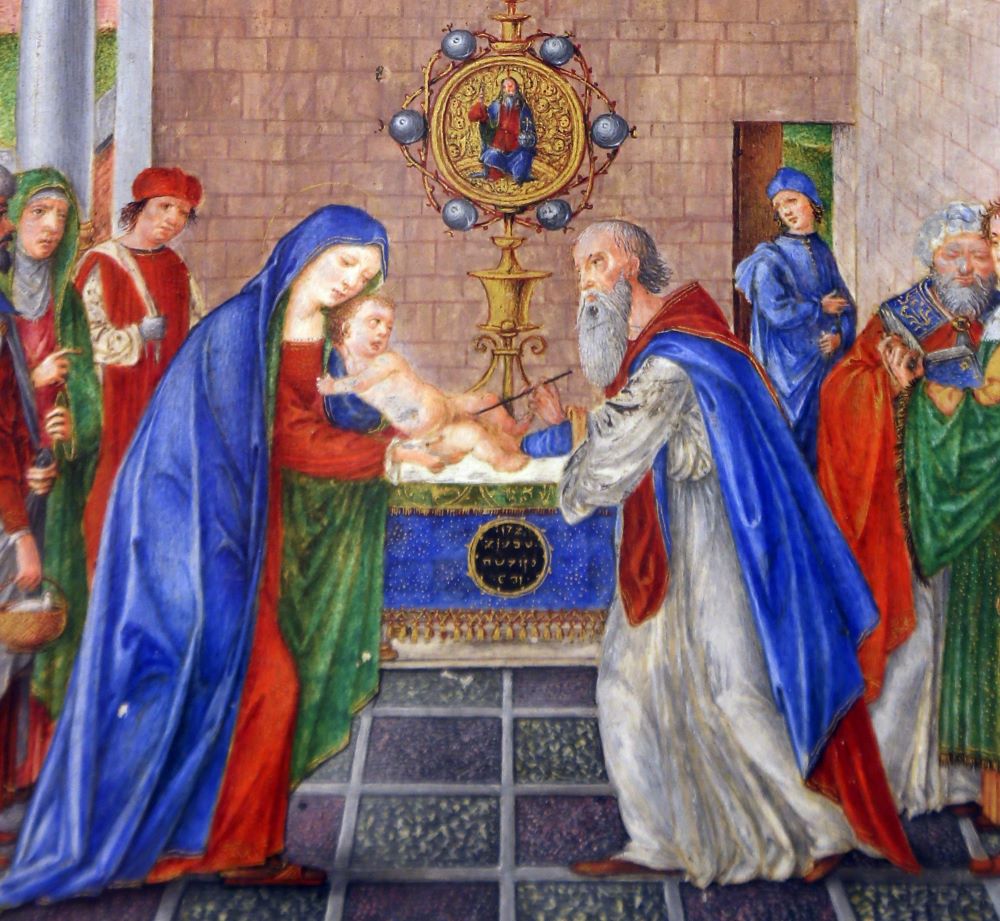“The Lord is circumcised on the eighth day as a child, receiving the name Jesus, for He is the Saviour and Lord of the world.” (Ode 8 of the Canon of Matins)
The next important event in the life of Jesus Christ, following that of the feast of the Nativity of Christ, is the event of the circumcision and naming of the Lord. The Holy Gospel relates: “And when the eight days were fulfilled for his circumcision, his name was called Jesus, given Him by the angel before He was conceived in the womb.” (Luke 2,21) Jesus Christ, being God and the Lawgiver, was not obligated to observe the religious prescriptions of the Jews; nonetheless, he willingly submitted to and observed them. Hence, on the eighth day after his birth he submitted to the rite of circumcision. We celebrate this event on the first of January.
The practice of circumcising children of the male sex is a very ancient custom among many peoples of the East. Circumcision was usually performed on boys in the stage of puberty and was a symbol of their initiation into manhood.
Among the Israelites, circumcision became a law at the time of Abraham. Among the Jews it had great significance for it was the symbol of their covenant with God. We read about this in the Book of Genesis:
“God said to Abraham: ‘And you therefore shall keep my covenant, and your seed after you in their generations. This is my covenant which you shall observe, between me and you, and your seed after you: All male kind of you shall be circumcised; and you shall circum- cise the flesh of your foreskin, that it may be for a sign of the covenant between me and you. An infant of eight days old shall be circumcised among you, every man-child in your generations.”’ (17,9-12)
For the Jews the prescription had far-reaching consequences. First of all, circumcision was the sign of one’s being a member of the people of God. It meant submitting oneself to the law and its duties. “I testify again to every man who has himself circumcised,” says St. Paul, “that he is bound to observe the whole law.” (Gal. 5,3) Through circumcision every Jew became a participant in the blessing and promises God made to his people. It was necessary for participation in the paschal sacrifice. Finally, non-observance of the law of circumcision incurred excommunication from the Jewish community. “The male whose flesh of his foreskin shall not be circumcised, such one shall be cut off from his people; he has broken my covenant.” (Genesis, 17,14)
In the Old Testament, the word “circumcision” is frequently used in a symbolic sense when, for example, we read of “circumcised” or “uncircumcised” hearts, lips or ears, to indicate obedience to the Lord God or rebellion against him. Thus, St. Stephen, the protomartyr, rebukes the members of the Sanhedrin: “you stiffnecked and uncircumcised in heart and ears, you always resist the Holy Spirit.” (Acts 7,51)
The Old Testament circumcision prefigured the New Testament baptism, which incorporates us into Christ. St. Paul calling baptism a circumcision not wrought by hands, says:
“In him, you also are circumcised with circumcision not made by hand, in despoiling of the body of the flesh, but in the circumcision of Christ. Buried with him in baptism, in whom also you are risen again.” (Col. 2,11-12)
The feast of Circumcision originated and developed first in the Western Church, and later passed over to the Eastern Church. The Latin Church originally called this feast the feast of the Octave of the Lord, that is, the eighth day after Christmas, which fell right on New Year’s Day.
The ancient pagans had a saying: “As the first day of the New Year is, so also will the whole year be.” Therefore on that day they conducted games, indulged in feasting, carousing and all kinds of masquerades. Men dressed as women and women as men. They put on skins of animals; for example, the head of a cow, deer or dog. They dressed as gods and goddesses and even abandoned themselves to immoral excesses.
St. John Chrysostom spoke out against this pagan merrymaking on the occasion of the New Year:
“They think that if they pass the first day of this month in pleasure and merriment, the whole year will be the same… This is extreme stupidity after this one pleasurable day to expect the whole year to be the same… The year will be happy for you in all things not when you carouse on the first day, but when you do what is pleasing to God on the first and every day of the year.” (Sermon on the New Year)
Holy Church, in order to counteract those loathesome pagan practices, summoned the faithful, on the occasion of the New Year, not to pleasurable joy but to fasting and penance for the sins of the pagans.
St. Augustine in his sermon on the New Year encouraged his faithful to do penance:
“In order to stop the carnal pleasure of the pagans, on the day of the Circumcision, with the help of God, we shall fast, except for those who, because of bad health cannot fast, and we shall publicly pray to God for those pitiful pagans who on these days of the New Year according to their custom indulge in sensuality and unrestrained excess.”
In some places this fast even lasted three days, as can be inferred from the seventeenth canon of the Council of Tours (567) in France: “Since between the feasts of the Nativity of Christ and the Theophany, the pagans celebrate their festivities, it is necessary during that time to fast for three days.” When in the sixth century, under the influence of the Christian faith, the pagan festivities fell into oblivion, the feast of the Circumcision assumed a joyful character. After the Second Vatican Council, the feast of the Circumcision in the Latin Church again received its original title: “Octava Domini” that is the eighth day after the Nativity of our Lord.
“Come, let us celebrate in the temple of the Lord the glorious name of Christ: Jesus was called today by a name worthy of God.”
The feast of the Circumcision speaks to us of sacrifice and self-denial. There is no genuine service of God without the observance of God’s commandments and the fulfillment of Christian duties. Every Christian must practice a spiritual circumcision, that is, he must conquer his senses, his evil inclinations and his passions. “For we are the circumcision, we who serve God in spirit, who glory in Christ Jesus and have no con- fidence in the flesh.” (Philip. 3,3)
The naming of Jesus reminds us of the holiness and power of that name and its great significance for every Christian. The Lord God himself bestowed upon Christ this name:
“She shall bring forth a son, and you shall call his name Jesus; for he shall save his people from their sins.” (Matthew 1,21)
Before his ascension into heaven, Jesus Christ gave his disciples the following promise:
“In my name they shall cast out devils; they shall speak in new tongues; they shall take up serpents; and if they drink any deadly thing, it shall not hurt them; they shall lay their hands upon the sick and they shall get well.” (Mk. 16, 17-18)
In regard to the holiness and power of the holy name of Jesus, St. Paul says:
“Therefore, God has exalted him and has bestowed upon him the name that is above every name, so that at the name of Jesus every knee should bend of those in heaven, on earth and under the earth…” (Philip. 2,9-10)
St. John Chrysostom commenting on the words of the Psalmist:
“O Lord, how admirable is your name in the whole earth,” (Ps. 8,2) says: “By this name death is destroyed, demons bound, heaven opened, the gates to paradise unlocked, the Holy spirit sent, slaves are freed, enemies become sons, strangers become heirs, and men become angels.” Commenting on the words “holy and terrible is his name”, (110,9) St. John Chrysostom says: “How is his name terrible and holy? Demons are terrified by his name, sicknesses fear it; using that name, the Apostles converted the whole world; David wielded it instead of arms and overcame the enemy; through it a wealth of great deeds was accomplished; through it we per- form the holy Sacraments.” (Sermon on the Psalms)
Thus, it is our sacred obligation to glorify Christ’s name, to honor it, to call upon it, to utter it reverently with our lips as did his Mother Mary and St. Joseph, and as did thousands upon thousands of martyrs and confessors who went to torture and death with that name on their lips. Through unceasingly invoking the name of Jesus in the so-called “Jesus Prayer” the ascetics achieved great holiness. The holy name of Christ is for us the pledge of blessings, a guarantee that our prayers will be answered; through it, we receive forgiveness of our sins, power to resist temptations, and grace to effect.



